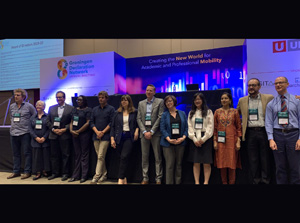Eye-opening data about global student mobility
Jun 25, 2019, 16:00 PM
legacy id :
Summary :
And facts about the seriousness of credential fraud.
Url :
Photo: GDN Board of Directors, including AACRAO Deputy Director Melanie Gottlieb.
by Troy Holaday, CollegeSource
I had the pleasure of attending the Groningen Declaration Network (GDN from here forward!) Annual Meeting in Puebla, Mexico, this
April.
I found the GDN to be a rich environment for learning more about the global nature of higher education and its current trends. Here are a few eye-openers, culled from my notes for the first day of this year’s meeting:
• Global student mobility continues to increase. It grew from 2.1 to 5 million learners in the period from 2001 to 2018.
• Transnational education is a highly competitive, multi-billion dollar industry. There are winners and losers in this market! The US and UK are currently losing market share, while China, Canada, and Australia are gaining.
• The world average “brain drain” is 5.4%. Africa is the highest at 10.8%. (Brain drain is slang for the phenomenon of educated individuals migrating away from their home country.)
• Credential fraud is a serious problem. Jayne Rowley, Chief Executive at HECSU/Prospects Hedd shared some alarming data
from the UK. 57% of people lie about their education on TV. 44% of employers never ask to see credentials. Of those 44%, only 20% verify the credentials presented to them. There are 243 known bogus universities in the UK alone. Christopher Jackson
of Paradigm estimates that the credential fraud industry collects roughly 2 billion dollars on an annual
basis.
• Methods of sharing credentials are evolving. In 2009, 0% of credentials were issued as e-docs. In 2018, there are 4 million credentials shared as data-rich documents.
Editor's note: The above is an excerpt, with permission, from a longer article discussing a variety of topics addressed at the GDN Conference, including blockchain, learner narratives, and competency-based education. Check out the entire story here.
